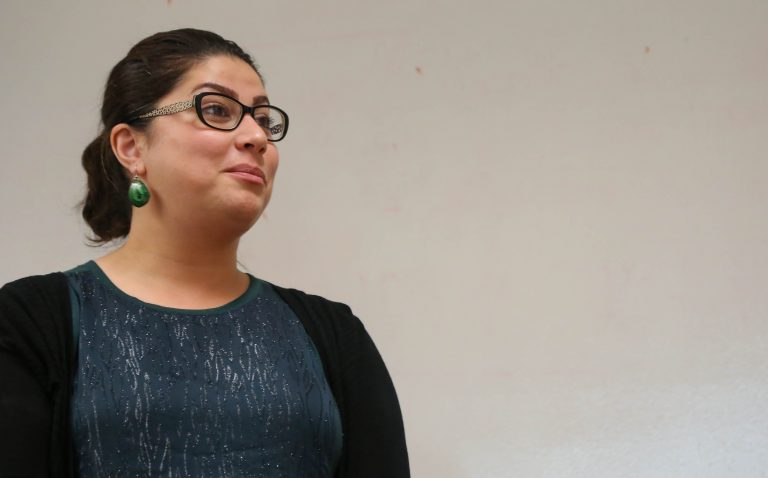

UBC Journalism lecturer Saranaz Barforoush. (Credit: Alex Migdal/UBC)
Saranaz Barforoush often gets asked why she pursued a PhD in journalism.
To some, academia seems at odds with the daily pace of newsrooms.
But Barforoush isn’t just interested in the mechanics of reporting. She’s equally attuned to representations in media and the forces that shape coverage.
And she’s eager to spark critical discussions with students at UBC School of Journalism, which she has joined as a sessional lecturer for the 2017–18 academic year.
“It’s fascinating to me how journalism is taught,” Baforoush said.
“I think we have a responsibility as former journalists and academics to make sure we’re equipping young journalists with every tool and knowledge.”
From Iran to Canada
Barforoush has plenty of insights to share.
She was born in Iran during the Iraq war and grew up in England. She later returned to Tehran, where she studied journalism and kickstarted her career covering cinema, arts, the tech boom and women’s issues.
In 2009, Barforoush moved to the U.S. to pursue a second master’s degree in southern Illinois.
She later attended the Philip Merrill College of Journalism at the University of Maryland to complete a PhD.
Earlier this year, she successfully defended her dissertation, “Tyrants, Thugs, Fanatics and Charmers: U.S. Media Coverage of the Leaders of China and Iran.”
During that time, she had her eye on the UBC School of Journalism.
“The projects being done at UBC really fascinated me because they are not easy subjects,” she said, referring to the International Reporting Program and Reporting in Indigenous Communities.
“How do you talk about people that aren’t from your culture and religion and society? How do you maintain journalistic values when you’re doing that? And why does that really matter?”
Global outlook
Barforoush is tackling those questions with the eight students in the International Reporting Program, which she’s co-teaching with associate professor Peter Klein. In a recent class, they discussed the idea of “othering” subjects in international reporting.
“It’s a problem because we train journalists in many instances based on the norm and values of the society they’re studying in,” Barforoush said.
“But what happens when they are assigned to do stories that are so different form the societies they come in? It’s about having the mindset of acceptance and questioning while being tolerant.”
Barforoush is also co-teaching the first-year Integrated Journalism course alongside senior instructor Kathryn Gretsinger and adjunct professor Frances Bula.
In addition, she’ll be teaching in Decoding Social Media, the undergraduate Journalism 100 course, and the Vancouver Summer Program.
“I’m really excited to be here,” Barforoush said. “The students have amazed me with how engaged and well versed they are. That’s something that gives me hope.”


